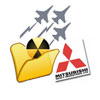 A report claims the recent hack of Japanese Defense Contractor Mitsubishi Heavy Industries may have led to the theft of sensitive data related to weapons systems and nuclear reactors.
A report claims the recent hack of Japanese Defense Contractor Mitsubishi Heavy Industries may have led to the theft of sensitive data related to weapons systems and nuclear reactors.
The report, on the Website of The Asahi Shimbun, cites unnamed sources as saying that malware planted on servers belonging to MHI exporting “sensitive information concerning vital defense equipment, such as fighter jets, as well as nuclear power plant design and safety plans.” The revelations come after an internal investigation by MHI that found evidence that the data was transmitted outside of the company network.
MHI acknowledged the cyber attack – the first publicly reported on a Japanese defense contractor – in September. The attack was first discovered in August and is believed to have infected around 80 MHI systems in the company’s Tokyo headquarters and production sites with malware. Targeted sites included shipyards and machinery works in Nagasaki and Kobe, as well as guidance and propulsion system works in Nagoya, according to a report by Reuters. An analysis of the infected computers found at least eight different Trojans, at least one of which was a key logger.
At the time, MHI said that data about its products and technologies wasn’t compromised in the attack. That claim now appears to be incorrect. According to the unnamed sources, the internal investigation revealed that information on fighter jets and helicopters manufactured by MHI was leaked, as well as data on nuclear plant design, nuclear equipment and earthquake safety measures.
The report comes alongside a report of an attack on members of the Japanese Parliament. Government computers and a server used by three members of the lower house were targeted by a sustained cyber attack that may have yielded passwords and user names. Furthermore, it appears sensitive e-mails and documents may have been monitored by the hackers without consent for a month, according to reports in the Japanese media.









